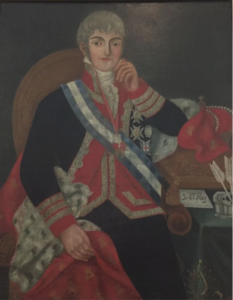There were major power struggles between European nations in the eighteenth and nineteenth centuries, with the conflicts between them becoming increasingly globalized as they fought for overseas territories. There were also changes in intellectual thought, which led to civil wars and the emergence of new forms of governance. The French Revolution, for example, brought about the end of the monarchy in France and provided a model of governance that inspired people in the Spanish empire.
In 1805 it became increasingly difficult for Spain to traverse the Atlantic and in 1806 and 1807 Britain attempted to take the port of Buenos Aires from Spain. In 1807 Spain’s problems were compounded when Napoleon Bonaparte’s troops entered the Iberian Peninsula. Initially Spain was an ally of France and Napoleon sought co-operation from Spain for his invasion of Portugal. The Spanish monarchy co-operated because it hoped to secure Southern Portugal for itself. However Napoleon betrayed Spain and French troops also occupied Spanish territory.

King Fernando VII of Spain
Portrait by José Gil de Castro
Museo Histórico Nacional, Santiago, Chile
In 1808 Bourbon King Ferdinand VII became King of Spain but was subsequently removed by Napoleon Bonaparte, causing a crisis, which reverberated throughout the Spanish Empire. King Ferdinand VII and his father had accepted an invitation from Napoleon to settle the matter diplomatically but were forced to renounce their positions and accept the Bonaparte family as their replacements. Napoleon’s brother Joseph Bonaparte would be the first Bonaparte King of Spain. He held the crown until 1813 as José I.
Ferdinand VII and his father were kept prisoner in France between 1808 and 1813 and this caused a power crisis throughout the Spanish Empire. According to Natalia Sobrevilla in Spain in the Nineteenth Century, the abdication of the Spanish royal family was met with considerable opposition in some quarters in Spain and this unleashed a constitutional crisis of unheard of proportions. There are a number of factors that led to the wars of independence in Spanish America but the royal abdications marked a real turning point in Spanish history.
The royal abdications were the real turning point for the Hispanic monarchy.
Thus the removal of the legitimate king undermined the foundations of the monarchical system and this had reverberations throughout the Hispanic world. Senior Spanish military officers maintained their allegiance to the crown and accepted Bonaparte as the new monarch. There was little resistance to the French from the senior military officers in command. The resistance that did come, was from peasants and people in the middle classes. On 2 May 1808, the people of Madrid revolted against the French occupation, but they were quashed and many were killed.
In addition to Napoleon’s usurpation of the king and royal family, the central and provincial governmental structures of the Spanish Peninsula broke down. The power was then appropriated by regional, decentralized juntas, which refused to recognize the legitimacy of the Bonaparte dynasty. These juntas insisted that in the absence of the king, power reverted to the provinces. This model of governance was also employed in Spanish America where juntas emerged and proclaimed that they would govern in the name of the absent king.
In the podcast above, Natalia Sobrevilla Perea discusses the effect of the 1808 crisis and the absence of a king. She considers the concept of revolution in this context. While there were great changes in Spanish America at this time the monarchic system was still supported in most places. Within this historical context Sobrevilla Perea asks, what are we speaking about when we speak of revolution and the restoration of the monarchy? Even when radical changes were made to governance and a constitution called the Cádiz constitution was drawn up, it envisaged a constitutional monarchy.
If the Napoleonic invasion of Spain was the catalyst for an independence struggle in Latin America, it was not the only cause of instability. During their rule, the Bourbon monarchy had imposed a series of reforms on Spanish America in order to gain more control over their territories and to increase the revenues they were able to gain from them. This contrasted with the administrative approach of the Hapsburg family who had preceded the Bourbons. The Bourbon reforms caused discontent in the Americas as they privileged those of Spanish birth over those who were born in the Americas. This meant that high administrative positions were held by Spaniards and local elites were disadvantaged.
Further Reading
Sobrevilla, Natalia. “How (not) to Make a Durable State.” In Spain in the Nineteenth Century, edited by Andrew Ginger and Geraldine Lawless, Manchester: Manchester University Press, 2018.